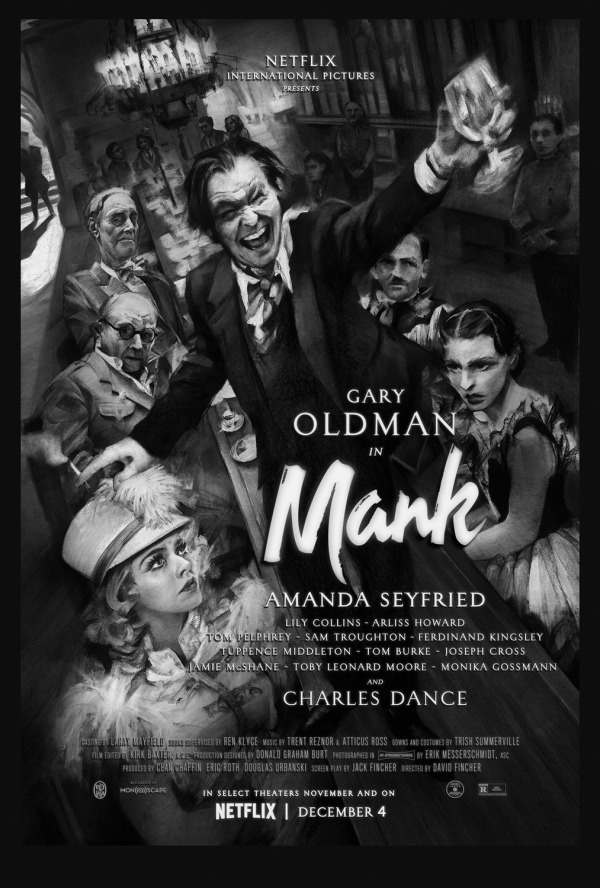MANK (Directed by David Fincher, 131 minutes, USA, 2020)
![]() BY DAN TABOR FILM CRITIC Based on the essay by film critic Pauline Kael, David Fincher’s Mank digs into the controversy behind just who wrote one of the greatest films ever made: Citizen Kane. While Orson Welles famously directed, produced and starred in Citizen Kane, Welles split the screenplay credit with one Herman J. Mankiewicz, AKA “Mank,” a crumbling genius with one foot in the grave and one on the bottle. While both men walked away with a Best Original Screenplay Oscar in 1942, it’s long been debated just how much Welles or Mankiewicz contributed to the script, which maps the rise and fall of fictitious publishing tycoon Charles Foster Kane (nee William Randolph Hearst, played low-key imperiousness by Charles Dance) while decoding the secret meaning of his cryptic deathbed utterance: “Rosebud.”
BY DAN TABOR FILM CRITIC Based on the essay by film critic Pauline Kael, David Fincher’s Mank digs into the controversy behind just who wrote one of the greatest films ever made: Citizen Kane. While Orson Welles famously directed, produced and starred in Citizen Kane, Welles split the screenplay credit with one Herman J. Mankiewicz, AKA “Mank,” a crumbling genius with one foot in the grave and one on the bottle. While both men walked away with a Best Original Screenplay Oscar in 1942, it’s long been debated just how much Welles or Mankiewicz contributed to the script, which maps the rise and fall of fictitious publishing tycoon Charles Foster Kane (nee William Randolph Hearst, played low-key imperiousness by Charles Dance) while decoding the secret meaning of his cryptic deathbed utterance: “Rosebud.”
Set in 1940 at the tail end of the great depression, the film begins with Mank (Gary Oldman) bedridden with a broken leg after an automobile accident. The troubled writer is hired to write Kane by Welles (Tom Burke), who exiles the titular Mank to a “dry farm” in Victorville, California, and away from drink and distraction, to pen his benefactor’s film debut in 60 days. The film isn’t your straightforward biopic and is more an origin story of that first 250 page draft of Citizen Kane, then titled American, loosely based on the life of publishing baron William Randoph Hearts. Like Kane, Hearst built a newspaper empire on the building blocks of sensationalism and yellow journalism that at the height of its powers controlled 30 newspapers that reached a combined 20 million readers. Mank frequented dinner parties at the Hearst Castle, where he served as boozy court jester for the aging tycoon and his then wife Marion Davies (Amanda Seyfried), a bright-eyed Hollywood star in the sunset of her career.
Mank was originally meant to be Fincher’s follow up to 1997’s The Game, with Kevin Spacey set to star in the title role. But because no one in Hollywood wanted to bankroll a black and white film about a black and white film at the time, the script was shelved only to be resurrected nearly a quarter century later by Netflix, which was looking to give the director a reprieve from his work on Mindhunter. Thankfully Spacey was replaced with Oldman, who gives a bleary-eyed gut-churning performance teeming with rye wit and bitter disillusionment, that painfully illustrates the true cost of genius. Mank is so many things to so many people, all the while struggling with the demons of alcoholism (the real Mank passed away at the young age of 55 due to uremic poisoning). It’s a precarious balancing act that has Oldman turning in one of the best performances of his career, aided by Amanda Seyfriend who’s simply radiant on screen exuding a blinding confidence every moment on screen. This had me wondering; where the Hell has she been hiding until now?
To mimic the look of the time, Fincher has gone to Nolan-esque lengths to re-capture the era in excruciating detail, re-animating a bygone time with period-perfect clothing, cars, and brands. Even the shadows seem vintage.The only thing that would keep Mank from being on a believable double bill with Kane is the more contemporary acting style employed by the cast. That being said Fincher who is a perfectionist when it comes to the moving image has even purposefully marred his film in the name of art, overlaying the immaculately composed frame with a grainy texture of visual damage. This coupled with the anachronistic use of a widescreen ratio that wasn’t introduced until the ‘50s is my only petty qualm with an otherwise exquisite work. This unnecessary tinkering goes for the sound too, strangely enough. The sound mix is purposely made to sound as if it was re-recorded on a soundstage at times, which has the effect of distracting the viewer from the sublime period-appropriate score by Trent Reznor and Atticus Ross.
Mank feels like a mash-up of Once Upon a Time in Hollywood and Citizen Kane, with Fincher copping the story structure of Kane to draft his own love letter to Hollywood. While encompassing his own obsessions and resurrecting the icons of his favorite bygone era to tell a depressingly contemporary story about the dangers of fake news and alternative facts. While lacking the more morose sensibilities of Fincher’s previous work, Mank feels like an evolution for the auteur. The film bestows on Mankiewicz his long overdue recognition as the troubled genius behind Kane, a credit that was previously only afforded to Welles, who spent the rest of his life living in the shadow of their masterpiece.
For best results, I highly suggest watching Citizen Kane BEFORE watching Mank to truly appreciate not only the narrative engine at work here, but how Fincher has so easily swapped the fictional characters for their very real counterparts. Lastly, this is inarguably the best film you will see this year.

